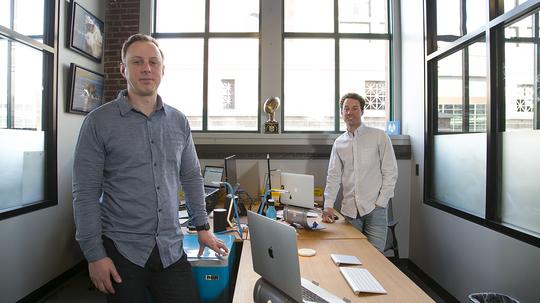
When financial technology startup SwipeSum began to plot what was next after its lease expired at its office in Laclede’s Landing, it kept an open mind.
SwipeSum, which provides software-focused payments consulting services for businesses, considered ditching the office all together and going fully remote, CEO Michael Seaman said. It also looked into coworking space to provide it with a smaller footprint to implement a hybrid model. Ultimately, it ended up sticking to a traditional office and even expanded its footprint, relocating from a 3,200-square-foot office to a nearly 6,000-square-foot space it is subleasing at 212 S. Central Ave. in Clayton.
SwipeSum is one of several St. Louis startups that have not only continued to operate out of traditional offices, but recently expanded their footprint. Those moves come as several other, larger St. Louis companies have downsized with a rise in remote and hybrid work amid the pandemic. Office vacancy rates in the region have risen to 15.7% in the first quarter of 2022, up slightly from 15.2% a year ago, according to research from commercial real estate firm Cushman & Wakefield.
And not all startups are expanding their offices. The pandemic led data startup BioRankings to forgo its office in the Cortex Innovation Community and become a fully remote company, for example.
But Text messaging startup Textel expanded its office space. Founder and CEO James Diel said Textel increased its footprint in 2020 and has continued to add to its team, which includes 36 employees, up from six at the start of 2020. It is operating out of its office, located at 1120 S. Sixth St., just south of downtown, in a hybrid work model that involves employees coming to the office a couple times per week.
“We really believe here that culture is important. While you can maintain a certain type of culture as a remote team, people need connection — real physical connection,” Diel said. “I think some of the best work occurs when people are together in the same. It was important for us to create a place people wanted to come, but didn’t have to come all the time.”
Some St. Louis startups continue to operate offices that include limited activity on a day-to-day basis. In 2021, Balto, which provides “real-time call guidance” software used by contact centers, inked a sublease for an approximately 23,000-square-foot headquarters at 1227 Washington Ave. in the city’s Downtown West neighborhood. Balto has made working out of the office optional for its 160-plus employees — half of which are based outside St. Louis — but co-founder and CEO Marc Bernstein has positioned its office “almost as an event space," using it to bring together its employees from across the country.
“Our philosophy is the office is no longer a productivity tool. The office is a connectedness tool,” Bernstein said. “The office is a way for people to get to know each other and to be able to share thoughts, ideas and experiences in a way that makes everybody better.”
A nearby neighbor, Decide Technologies, with an office at 1314 Washington Ave., has taken a similar approach. The adtech firm has opened a two-story, 4,000-square-foot office in Austin, Texas, even as it adopted a “work from anywhere” approach. CEO Gabe Lozano said the new office will be used by its small team of Austin-based employees and for events and serve as a hub that employees across the country can visit.
Even prior to the pandemic, technology startups had a “high acceptance” for remote work, Cliff Holekamp, co-founder and general partner of St. Louis-based venture capital firm Cultivation Capital, told the St. Louis Inno. Today, nearly all tech startups operate virtually to some degree, Holekamp said.
“Before the pandemic, it was believed that companies with cohabitated teams earned a valuation premium over companies with distributed teams working virtually,” Holekamp said in an email. “Since the pandemic, that is certainly no longer the case. It will be interesting to see, once the pandemic is distantly in the rear-view mirror, if acquirers return to preferring co-located company teams."
At SwipeSum, Seaman said the company’s decision to move to a larger office will help accommodate its rapid personnel expansion and provide each employee with his or her dedicated desk. Currently, Seaman said a majority of SwipeSum’s employees are showing up to the office five days a week, which he attributes to the company’s rapid growth and the excitement that comes with expansion.
“When you have something exciting like that and new employees, people like to be together,” Seaman said.
But with its expanding office, Seaman said SwipeSum employees still have the option to work from home when they choose.
“I think every one of our employees wouldn't be at SwipeSum if we didn’t have full trust in them to work wherever they are most productive,” he said. “If you’re more productive at home, then we want you to be at home.”











